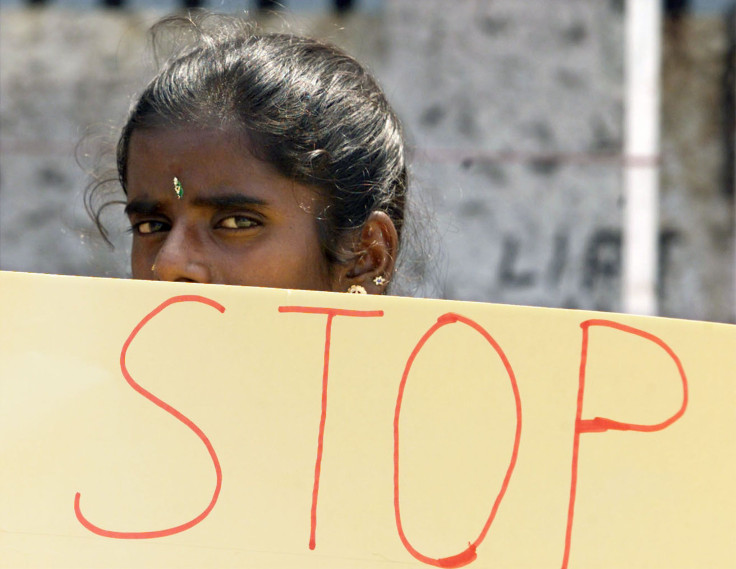Gang Rape In Sri Lanka: Will It Spark Nationwide Outrage As In India?

A 47-year-old woman was allegedly gang-raped by four men in a suburb of Colombo, Sri Lanka, in an incident with parallels to the high-profile sexual assault in Delhi late last year that sparked nationwide soul-searching in India.
Police spokesman Prishantha Jayakody told the Press Trust of India that the unidentified woman was assaulted at a taxi stand when she went to ask for directions, having gotten lost in the suburb of Mirihana.
The four alleged attackers were apparently taxi drivers or employees.
(In the Delhi incident, a 23-year-old medical student was attacked in a private bus by five men, including the driver.)
Jayakody said two arrests have been made in connection with the case, while authorities are seeking the other two suspects.
"The victim has been admitted to hospital," Jayakody added.
Lak Vanitha, or "Lankan Women," a local women’s rights group, plans to stage a protest demonstration outside a police station in the same suburb where the attack took place.
"We have about 1,400 rapes recorded each year in Sri Lanka," Lak Vanitha’s leader, Shanthinie Kongahage, told PTI.
"The actual number [is probably] much [higher]. Most victims are afraid to report [the crimes to the police] because of social stigma or out of fear of more violence. We are pressing the police to ensure a speedy investigation and a quick prosecution."
Kongahage added that the Delhi gang rape, which her group also protested, generated so much attention that she hopes it triggers similar activism in the island nation just off the southern coast of India.
"Lot of women [in Sri Lanka] are harassed by three-wheel drivers [auto-rickshaws]" she added. "We need to take a stand and say enough is enough."
The Asian Human Rights Commission, or AHRC, noted that the attackers in the Colombo case kept condoms in their vehicles, suggesting they may have raped women before, perhaps on a regular basis.
But AHRC warned that in Sri Lanka, the authorities are generally apathetic about acts of violent crime, and the media tends to forget about such incidents after the initial shock has worn off.
“In Sri Lanka, while there is a public acknowledgement of the existence of widespread lawlessness involving particularly shocking offenses against women, the public itself reacts to these events apathetically,” ARHC said.
“There is no energetic pursuit of justice or demands for accountability from the government. Such apathy that prevails amongst the public regarding heinous crimes, as well as the criminal negligence on the part of the government to resolve the problems of the law enforcement agencies, is indicative of the deeper malaise in the Sri Lankan society and the Sri Lankan system of justice.”
The commission added that the result of this apathy is that crimes reoccur and that “there is no real attempt to ensure protection to the people. This situation has resulted in the creation of a sense of apathy in the society as a whole, even in the face of gruesome crimes such as the gang rape of this woman.”
Meanwhile, the Asian Mirror newspaper of Sri Lanka reported that 1,673 women were reported raped in 2011, including some tourists.
The country’s Socialist Women’s Union, or SWU, claims that a woman is raped in Sri Lanka every 90 minutes and that almost one-half of all crime recorded in the country are rapes of women and girls (mostly females under the age of 16).
In addition, SWU claimed that 90 percent of women who ride on public transport have been “abused” in one way or another by men.
The Sunday Times newspaper of Sri Lanka reported that incidents of rape have been rising steadily in the country and that the spike in assaults on children have likely been partly triggered by youths being kept in care of “guardians” while their parents journey abroad for employment.
Senior Superintendent of Police Jayantha Wickremasinghe told the Times the attackers in these cases are almost always familiar to the victims.
“We also see a trend where teachers and principals who are mandated to protect children during school hours are abusing children," Menaca Kalyaratne, the director of Save the Children, warned. "What is more worrying than the incidents of abuse is that still parents think that these are isolated incidents. Child abuse especially by teachers and children is no accident. It is a calculated crime committed against children.”
It is also believed that the 26-year civil war that engulfed Sri Lanka between 1983 and 2009 accelerated the rates of sexual violence against women (particularly by military personnel and security officers) and took a particularly inter-ethnic tone and left behind a brutal legacy.
"The consequences for women and girls have been severe," the International Crisis Group wrote of Sri Lanka in December 2011. "There have been alarming incidents of gender-based violence, including domestic violence within the Tamil community, in part fueled by rising alcohol use by men. Many women have been forced into prostitution or coercive sexual relationships. Some have also been trafficked within the country and abroad.
“Pregnancies among teenagers have increased. Fear of abuse has further restricted women’s movement and impinged on education and employment opportunities. The fact that women must rely on the military for everyday needs not only puts them at greater risk of gender-based violence, but also prevents them from building their own capacity within communities. The island-wide spate of attacks on women by individuals ... exposed the near-complete collapse of trust in law enforcement."
© Copyright IBTimes 2024. All rights reserved.





















